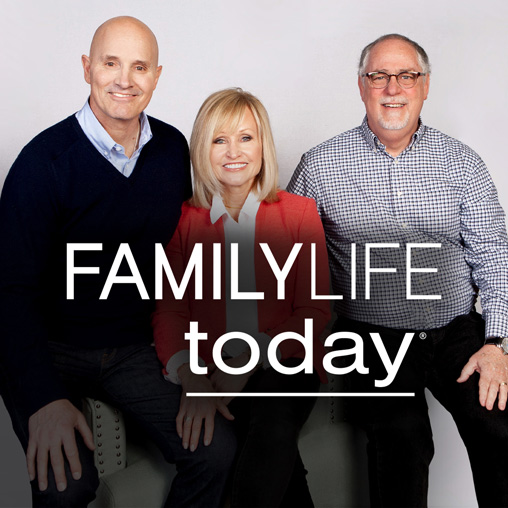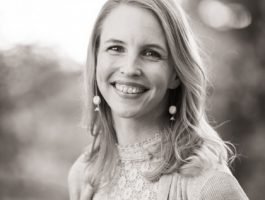
What Does It Mean To Be Wholly a Woman?
Author Abigail Dodds, a wife and mother to five, talks about the way men and women are inherently different from one another. It's easy to generalize male and female characteristics, but we must be careful. Dodds admits she doesn't really fit the mold of a woman with a gentle and quiet spirit. The gifts of the Spirit, she reminds us-love, joy, peace, patience, kindness, goodness, faithfulness, gentleness, and self-control-can be exhibited by all believers, regardless of gender.
Show Notes
About the Host
About the Guest
-
- Find resources from this podcast at https://shop.familylife.com/Products.aspx?categoryid=130.
- Download FamilyLife's new app! https://www.familylife.com/app/
- Check out all that's available on the FamilyLife Podcast Network. https://www.familylife.com/familylife-podcast-network/
-
Dave and Ann Wilson
Dave and Ann Wilson are hosts of FamilyLife Today®, FamilyLife’s nationally-syndicated radio program. Dave and Ann have been married for more than 38 years and have spent the last 33 teaching and mentoring couples and parents across the country. They have been featured speakers at FamilyLife’s Weekend to Remember® marriage getaway since 1993 and have also hosted their own marriage conferences across the country. Cofounders of Kensington Church—a national, multicampus church that hosts more than 14,000 visitors every weekend—the Wilsons are the creative force behind DVD teaching series Rock Your Marriage and The Survival Guide To Parenting, as well as authors of the recently released book Vertical Marriage (Zondervan, 2019). Dave is a graduate of the International School of Theology, where he received a Master of Divinity degree. A Ball State University Hall of Fame quarterback, Dave served the Detroit Lions as chaplain for 33 years. Ann attended the University of Kentucky. She has been active alongside Dave in ministry as a speaker, writer, small-group leader, and mentor to countless wives of professional athletes. The Wilsons live in the Detroit area. They have three grown sons, CJ, Austin, and Cody, three daughters-in-law, and a growing number of grandchildren.
-

Abigail Dodds
Abigail Dodds (BA, Bethel University) is a wife and mother of five children. She writes and teaches Bible studies for the women at Bethlehem Baptist Church, where her husband, Tom, serves as an elder. She contributes to desiringGod.org and blogs at her personal site, hopeandstay.com.
Author Abigail Dodds, a wife and mother to five, talks about the way men and women are inherently different from one another. But, the gifts of the Spirit, she reminds us, can be exhibited by all believers.
Bob: In Genesis 1, the Bible says that God created human beings as male and female. Abigail Dodds says that’s at the core of what women need to understand about who they are as women.
Abigail: To be a woman means to have been created. Now, that sounds like nothing; right? It’s kind of like saying “’X’ is ‘X.’” But I do believe this with all my heart; and I’m just trying to say: “What God has made in woman—in that word even, as it defines what we are—is itself fully valuable.”
Bob: This is FamilyLife Today for Monday, May 17th. Our hosts are Dave and Ann Wilson; I'm Bob Lepine. You can find us online at FamilyLifeToday.com. Does the Bible give us a clear sense of the difference between men and women?—and what are we to understand about how we were made differently? We’re going to talk about that today with Abigail Dodds. Stay with us.
And welcome to FamilyLife Today. Thanks for joining us. I just met our guest for today’s program a little while ago, and I’ll introduce her. Abigail Dodds is joining us on FamilyLife Today—welcome.
Abigail: Thanks for having me.
Bob: We’re happy to have you here. I can already tell—
Dave: I know what you’re going to say, Bob!
Bob: Okay; let’s see! Let’s see!
Abigail: Oh, boy; okay.
Dave: I know what you’re going to say—
Bob: I can already tell—
Dave: —that Ann and Abigail are going to have a great conversation today.
Bob: I think that’s true—
Dave: Okay; that wasn’t it?
Bob: —that’s not exactly what I was going to say.
Dave: Okay!
Bob: I was going to say, “I can already tell she is a very courageous woman; because just to tackle the subject she has tackled in this book, in this day, takes some courage”; don’t you think?
Ann: I think it does take courage, and it takes conviction. This has to be a conviction for you to put your thoughts into words. Also, she’s brave because she’s left her five children [Laughter] that are from five to fifteen.
Abigail: Yes.
Bob: Maybe it’s not brave; maybe it’s just she—
Ann: Yes; she needs a break?
Abigail: —“She has a couple of screws loose.” [Laughter]
Bob: Abigail is a writer; she lives in Minneapolis; married, with five kids; a regular contributor at Desiring God Ministries. The subject you’ve decided to tackle is the subject of trying to come up with a biblical definition or understanding of womanhood and femininity.
The reason that I don’t have to explain why that’s so courageous to try to come up with that: we have this cultural idea of what masculine and feminine are; and now, we have a backlash against the cultural, saying, “No, the culture/there shouldn’t be any definition.” You’re trying to say, “Okay; what does the Bible tell us about how men are different than women, and how can we embrace that and believe it?”
You knew you were sailing into headwinds when you sat down to write it; didn’t you?
Abigail: Right; yes. I don’t think you can live in this world and not know that you’re tackling something that a lot of people maybe don’t want to hear about or are very apprehensive about hearing about. I get that. I think I can be apprehensive when I pick up books on this topic, because there are so many ways to go wrong; and there are so many ways to step on people’s toes, unintentionally.
Even as you’re trying very hard to say something true, and winsome, and godly, what you say might not line up with another person’s lived experience or with damage that they’ve had done to them in their experiences. To try and wade into those waters is difficult, but still necessary and just still so important—that we understand that Christ applies to every single bit of our life—and there’s none of it we should leave unturned.
Bob: One of my sons has coined a phrase—I don’t know if he invented it or if he heard somebody else use it—but he talks about “genderalities.”
Ann: That’s a great word.
Bob: Isn’t it a good phrase?
Ann: Yes.
Bob: It’s this idea that we have these preconceptions of what gender should be, based on cultural standards rather than on biblical standards. Some of this comes out of—I think I’ve told this before—he was at a youth retreat when he was in junior high. The speaker was saying, “You know, guys and girls are different. Guys like sports, and girls like to read.”
Okay; so my son, who loved to read and wasn’t particularly athletic, comes home and goes, “So, what am I?”
Abigail: I’ve had those same experiences—of hearing the people up front use some generality to describe what it means to be a woman—and kind of come away, scratching my head, thinking: “Huh; I don’t know if I fit. Does that mean I’m not a true woman, or does that mean I’m not a biblical woman?”
That’s why we have to go back to the Word over and over and be looking at what God is saying about what He’s created/what He’s made and what that means. You know, my grandmother was a farmer’s wife; and she worked out in the hot sun. She is sweating and working alongside him. My mom, a farmer’s daughter—I mean, nothing gave her more joy than to take the chainsaw out and do some yardwork—[Laughter]—these were wonderfully feminine, godly women, who were not afraid of some sweat and hard work. I just think we need to make room for those kinds of things when we talk about men and women.
Bob: I just want our listeners to hear: wonderful, godly, sweating, chainsaw-wielding women—
Abigail: That’s right.
Bob: —that can all work together—right?
Abigail: That’s right.
Dave: That just described my wife.
Ann: I like that, actually; because Bob’s wife, Mary Ann—she loves to do yardwork and mowing the grass—so do I. I think that doesn’t mean we’re not feminine.
Abigail: No, not a bit.
Ann: Right.
Abigail: I mean, the Proverbs 31 woman—my goodness; I’m pretty sure she was getting some sweat going. [Laughter]
Ann: Yes, this woman was remarkable!
Abigail: Right.
Ann: The first time I was at the Weekend to Remember®marriage conference, and they were talking about what a woman is—and that nurturing part of her and she has a “quiet and gentle…”—I thought, “Oh, I don’t even fit into the Bible.” I think some women feel like that; have you found that?
Abigail: Yes, I think that’s a very common way to feel. I know I, myself, have thought that—like: “Wow; I have too many strong opinions; I have too much going on; I care too much about all the wrong things,”—things like that.
I think, for all of us, those principles set up—of a gentle and quiet spirit that Peter is admonishing us to be like—that’s something that we need to learn with an older woman’s arm around our shoulder, who’s telling us: “I felt the same way when I heard that,” and “Here’s how God grew me in that area, even so; isn’t He wonderful to do that?”
It’s a really hard thing, I think, to hear—sometimes from on high or from a certain way that’s a little bit more detached—where we think: “I have no model for this,” or “I just don’t know the steps forward. If that’s what I’m supposed to be, how do I get there?—because I have more opinions than I know what to do with, and I want to say them all, and I want to be really adamant about all of them.”
Tempering all those things, by the Holy Spirit’s help and in the community of believers, is such a valuable thing and a way of growing in grace in those areas that we know are biblical, and yet not feeling alienated, recognizing that, “Yes, my natural bent may be a certain way; and yet, that doesn’t mean I can’t cultivate a gentle and quiet spirit by His grace.”
Dave: You open the book with sort of an—in my opinion, angst—sort of a look at the womanhood in the church today. Talk about that a little bit, because that felt like it was coming from your soul.
Ann: That was the word that I felt, too, Dave; because you say, “I’m partly distressed over the state of Christian women,” and that feels like an angst to me. What made you write that?
Abigail: We are facing winds from one direction or another. The culture is kind of blowing us all in one direction, in terms of: “There are zero differences between men and women. As a matter of fact, a man can be a woman; a woman can be a man.” Sometimes those winds—they generally are blowing into the church as well, but often we have our nose to those winds a little bit—we know they’re there; so we are generally trying to push back to some degree, although I think we still can be/all of us can be blind to some of them anyway.
Then, sometimes what happens is we’ll swing the pendulum the other way really hard to make sure that we don’t think like the world/act like the world, but we might not do it with our feet in the Scripture; it might just be a reaction. If that happens, then what you do end up with is legalism or things of that nature. That’s sometimes the angst I feel—is the different ways the pendulum is swinging, coming from different angles—can really make it hard to feel like: “Which way am I supposed to be pushing against?! What am I aiming at? What am I aiming for?”
My burden was really just to say: “We can’t talk about what it means to be a biblical woman without putting Christ in the conversation. We can’t abstract Christ away from what it means to be a biblical woman. We need the new birth; we need to see ourselves as having been made through Christ and for Christ. Once we do that, our conversations have such a more sturdy footing. We can look to biblical examples of women and, all of a sudden, our feet are much more settled on solid ground when we’ve really thought through what it means to be made through and for Christ.
Bob: But you know that 90—I don’t have the exact number here—we’ll say
97 percent of what the Bible says about living the Christian life is not gender-specific.
Abigail: Right.
Bob: So the fruit of the Spirit is for all of us; right?
Abigail: That’s right.
Bob: The imperatives that follow the indicatives—those are for all of us—there are only a few places where language gets gender-specific. That’s where you say, if the language of the Bible gets gender-specific, we ought to stop and go, “Okay, why did he turn here and say, ‘Women, this is for you’”?
Abigail: Right. I try to give an analogy—like if your uncle writes a letter to the family and he’s telling all about something that happened, and he’s: “Dear family,” and it’s a whole long letter—and then he pauses at one point and says, “And to my niece…”—and then says something else, and then, continues on. Now, the main points of the letter are probably in the body that goes to all the family; but to the niece, she will pay certain attention to the part that’s written with her name there.
Just like the Bible, the gospel is the good news about Jesus Christ. The point of the Bible is to get us to Christ—to know and reveal the person and work of Christ/that’s how we know the Father—that’s the point. Yet, there are really specific ways that that applies to men and women that the biblical authors don’t hold back on. It can’t be received, though, without understanding that bigger piece. We will not love anything in the Bible unless our old heart has been taken out and a new heart put in. That was another thing I really wanted to lay the foundation for is: “Without the new birth/without a new heart, this will not—
Bob: —“make sense.”
Abigail: Yes.
Bob: So the person, who is just thinking, “Galatians 3:28,” right now, they’re just going: “But it says, ‘There’s neither male nor female…’—these distinctions that you’re trying to impose—in Christ, the distinctions go away”; and “Women should have the freedom to be, and to express, and not/the boundaries between men and women have been dissolved in Christ.”
Abigail: Well, I love that passage from Galatians—and I don’t like it when people pit Scriptures against each other—like, “Well, this is the Scripture that people over here like to use; but we kind of stay away from it because we’re afraid it might undermine our—
Bob: The proof text wars?—yes. [Laughter]
Abigail: —“this one might undermine our point of view.”
I think, what an incredible gift that—yes, in Christ—I am a co-heir. The way I understand that is—it’s not that distinction vanishes—in heaven, we know that it will be every tribe, tongue, people, and nation. The distinction will still be there, in that sense, in terms of tribes, tongues, peoples, and nations—that’s the way I tend to think of it is—it’s this diversity brought to unity in that we are all heirs, together, with Christ but not that that flattens everything about us.
Bob: Equal value, equal worth, equal inheritors, equally loved by God; with, still, God-given distinctions that are a part of who we are.
Abigail: Yes.
Dave: Yes; I mean, the distinctions—and I can feel it as you talk about womanhood—it’s in your subtitle: Free, Whole, and Called in Christ. I want to hear what you would say, as a woman, who’s wholly woman. I think Bob and I probably understand manhood. Do we understand womanhood?
Bob: You know, honestly, I’ve been here for more than 25 years. To ask the question, “Come up with a biblical definition of masculinity and femininity,” is one of those things that we keep coming back to—not wanting to go too far and not wanting to blur what the Bible teaches—just find what’s the sweet spot. That’s why, when I saw this book, I said: “I’m glad Abigail’s figured it out. We’ll get her here—[Laughter]
Ann: And she’s bold enough to write about it; exactly!
Bob: To Dave’s point, if you had to come up with that one sentence, “Here’s what it means to be wholly a woman,”—w-h-o-l-l-y a woman—what would you say?
Abigail: To be made wholly a woman is simply to be created by God as a woman. Now that sounds like nothing; right? It’s kind of like saying, “’X’ is ‘X,’” but I’m not trying to tell you what the attributes of a Christian woman are; because I think we can find those in the Scripture. But when we ask the question, “What is it to be a woman?” I simply want to say something so foundational, because our culture is saying that to be made a woman isn’t a woman.
Unless we start with: “To be a woman means to have been created,” that means you’re a creature; it means you didn’t make yourself; and it means you don’t decide what you are. It means to be created by God as a woman. That has implications for your body; it has implications for the instructions that you’re given in Scripture; and certainly there is a deeper essence to that—that, you’re right, I’m not going to be able to put words to.
Ann: It’s also in His image—
Abigail: Yes.
Ann: —so we bear qualities of God/that we represent Him—which is beautiful—that are distinct and can be different from men.
Abigail: Right.
Ann: We don’t always embrace; and yet, God is reveling in His creation.
Bob: This is a conundrum; and we have to be careful about being too boxy and saying, “Femininity means this; and if you’re not this, you’re not feminine,” because that may depend on: “In what environment is this happening?”; right?
Dave: Here’s another question for you: “Do you feel free to be wholly woman in the culture and in the church?”
Abigail: Well, I think I would say, “Yes; I feel completely set free in Christ to be exactly as He’s made me.” I feel that I don’t think you’ll have the freedom piece until you’ve had new birth. I would say being wholly woman—w-h-o-l-e—even if you aren’t a believer, is something that we can’t get around.
One of the things that gets said in the church is: “I don’t like it when people treat me as just a woman. I want you to see me as a human,” or “I don’t like to be treated as just a woman. I want you to see me as a person.” Now, to that, I would say, “Amen to treating people as people”; but the part of that that misses something really valuable is that to be a woman is to be fully human. We shouldn’t talk about the word, “woman,” as though it’s small and degrading but “If I want to treat someone like they’re important, well then, I’ll treat them more like a human, or a person, or a man.”
No! I would like it for everyone to treat me as a woman and let that be as big as it really is—it’s a full reality. I’m a human, as a woman; and so you should treat me, accordingly, not as though being a woman is only the small slice of specifics. “But if you were going to treat me really well, then you would treat me like a person,”—well, why not just treat me as a woman, and then you decide that that is a good thing; it is a valuable thing.
We get into these semantics because we are trying to be seen as valuable. I’m just trying to say, “What God has made in woman—in that word even, as it defines what we are—is itself fully valuable.”
Bob: Do you feel free, Ann, to be a whole woman and to embrace biblical femininity in the church and in the culture?
Ann: I feel total freedom in my relationship with Christ. I feel like He celebrates me; I feel like He complements my gifts and my strengths. However, I don’t always feel that freedom in the church or in culture.
Bob: You don’t feel like everybody else is giving you that freedom?
Ann: Yes; I’m always thinking: “What is this person…? What is this church…? Will they celebrate me as well?” Or the culture: “Are they celebrating me to the point where it’s an idolization of me being a woman?” It’s a tricky path to walk; and yet I do know, in Christ, He celebrates me.
I think, culturally speaking, when Jesus walked the earth, it was a different day. There were many Hebrew scholars that wouldn’t even believe that women had a soul. You have Jesus walk onto the scene, where He is elevating women and even using them in His teaching—John 4, with the woman at the well—that was unheard of, that He would not only speak to a Samaritan woman, but He would have a conversation and even ask her for water. He would become unclean.
Yes, it’s a tricky day; and yet, a beautiful day to be alive as a woman. And the place called America is very different from other parts of the world.
Bob: I’m hearing two big ideas out of the conversation we’ve had today—maybe three. One is that the first thing in understanding what it means to be a woman, or a man, is to experience the new birth.
Ann: Yes.
Bob: Apart from the new birth, you’re always going to have a distorted view of manhood or womanhood.
The second thing I’m hearing is that it’s hard to nail down, into a sentence or a phrase, what masculinity and femininity are. There are shades; there are gradations; there are words we can put to that. We don’t want to get too concrete with what those words mean or try to box somebody in, but maybe it’s more about the direction you lean than it is an absolute descriptor of you.
Then the last thing I’m hearing both of you say is: at the end of the day, the freedom you feel to be the woman God’s made you to be depends on whether you’re concerned with what He thinks about you or whether you’re concerned with what church people or the broader culture think about you.
If you’re looking around for affirmation of your womanhood from your peers, or from the culture, or even from folks in the church, you’re probably going to be frustrated. But if you’re saying, “Lord, I want to be the woman”—in our case, Dave, the man—“that You’ve made me to be. I want to fully embrace the fact that You made me as a woman”—or as a man—“and I want to live for You.” When you look to His Word and understand His pleasure in that, you can kind of tune out what everybody else is thinking about you and just live in that.
Dave: It sure would be nice if there was a book written on this, Bob. Wouldn’t that be nice?—[Laughter]
Bob: What a thought!
Dave: —that a woman could read? [Laughter]
Bob: As a matter of fact, Abigail has spent a long time working on a book called (A)Typical—this is hard to say on radio. So the word is (A)Typical Woman. If I search for it on the web, do I search using the word “A”? Do I start (A)Typical…? You don’t know; do you?
Abigail: I don’t.
Bob: Okay; just go to FamilyLifeToday.com. We have it in our FamilyLife Today Resource Center; you can order the book from us online at FamilyLifeToday.com; or call 1-800-FL-TODAY and say, “I want a copy of Abigail Dodds’ book, (A)Typical Woman: Free, Whole, and Called in Christ”; we’re happy to send it to you. Again, you’ll find it online at FamilyLifeToday.com; or you can call 1-800-358-6329; that’s 1-800-“F” as in family, “L” as in life, and then the word, “TODAY.”
And we want to take just a minute and say, “Thank you,” to those of you who have already gotten in touch with us to say, “We want to help you take full advantage of the matching-gift offer that has been made available to FamilyLife® during the month of May.” We got some great news. That matching gift offer has now been expanded. It was $250,000. We’ve had an extra $100,000 added; so every donation made this month is going to be matched, dollar for dollar, up to a total now of $350,000.
We’re very excited about this and we have gotten permission for those of you, who would like to join the FamilyLife team as monthly Legacy Partners, every donation you make for the next 12 months is going to be matched, dollar for dollar, as long as there are funds in that matching gift; so your giving goes even farther when you become a monthly Legacy Partner.
Legacy Partners are the financial backbone of this ministry. You’re the ones who say, “We want to make sure this program continues to be available in our community, online, and around the world.” When you become a Legacy Partner, in addition to the thank-you gifts we want to send you for your donation—a copy of Aaron and Jamie Ivey’s books called Complement; a flash drive that’s got programs that have been some of the most influential programs in my own life over the last 28 years—in addition to all of that, when you become a Legacy Partner, we’re going to send you a certificate so you and your spouse can attend an upcoming Weekend to Remember® marriage getaway. We’ll cover the cost of the registration for you as a Legacy Partner. And that’s transferrable; if you want to pass that on to somebody else, you can do that as well; so think about becoming a monthly Legacy Partner.
Whether you make a one-time gift or sign on to give over the next 12 months, your gift will be matched, dollar for dollar, up to that total of $350,000. There’s more information about all of this online at FamilyLifeToday.com. You can give, online, at FamilyLifeToday.com; or you can give by calling 1-800-FL-TODAY. Thanks, in advance, for your ongoing support of this ministry. We really appreciate it.
And we hope you can join us, again, tomorrow. Abigail Dodds will be here again. We’re going to continue the conversation about understanding womanhood and femininity. What is it that God has in mind for women when He makes them women? We’ll talk more about that tomorrow. I hope you can be with us for that.
I want to thank our engineer today, Keith Lynch. We got some extra help from Mark Ramey this week, along with our entire broadcast production team. On behalf of our hosts, Dave and Ann Wilson, I’m Bob Lepine. We will see you back tomorrow for another edition of FamilyLife Today.
FamilyLife Today is a production of FamilyLife of Little Rock, Arkansas; a Cru® Ministry. Help for today. Hope for tomorrow.
We are so happy to provide these transcripts to you. However, there is a cost to produce them for our website. If you’ve benefited from the broadcast transcripts, would you consider donating today to help defray the costs?
Copyright © 2021 FamilyLife. All rights reserved.
1




